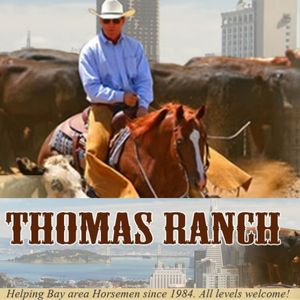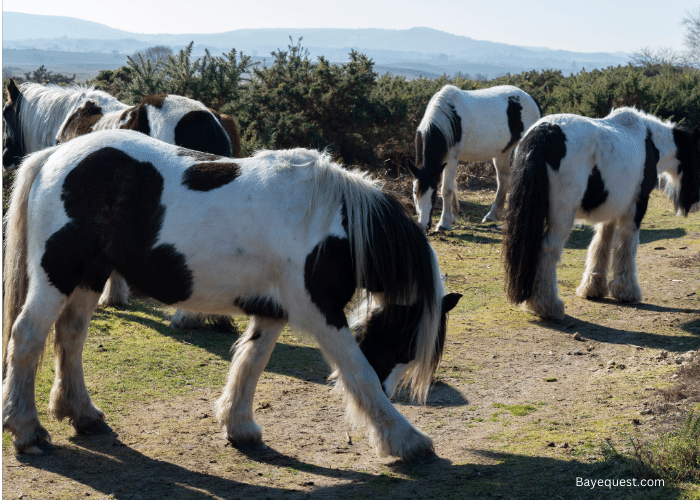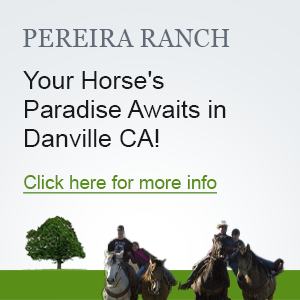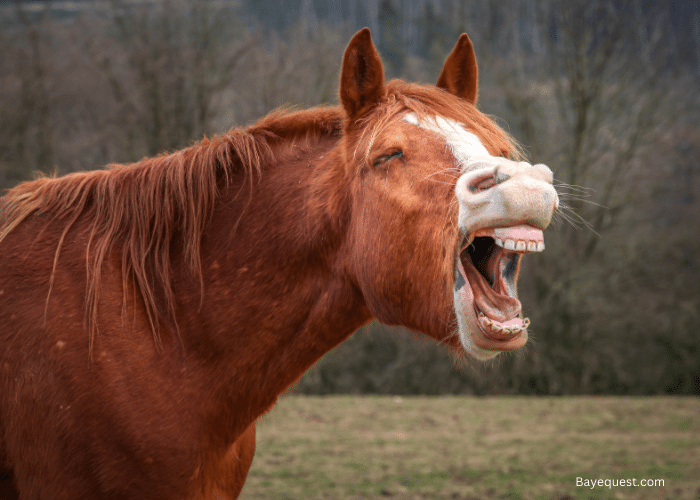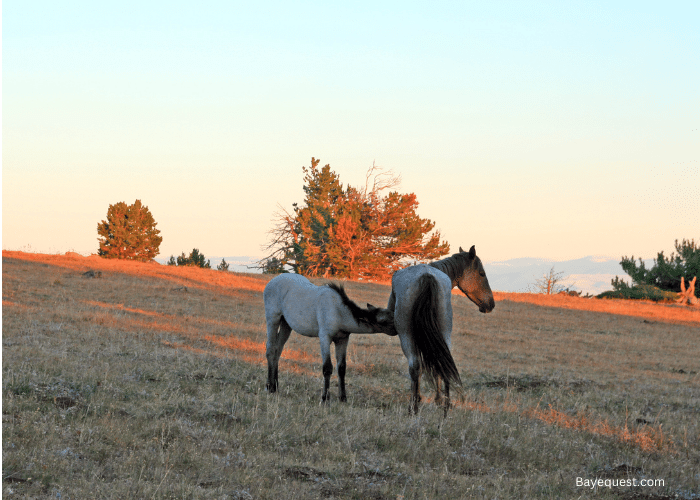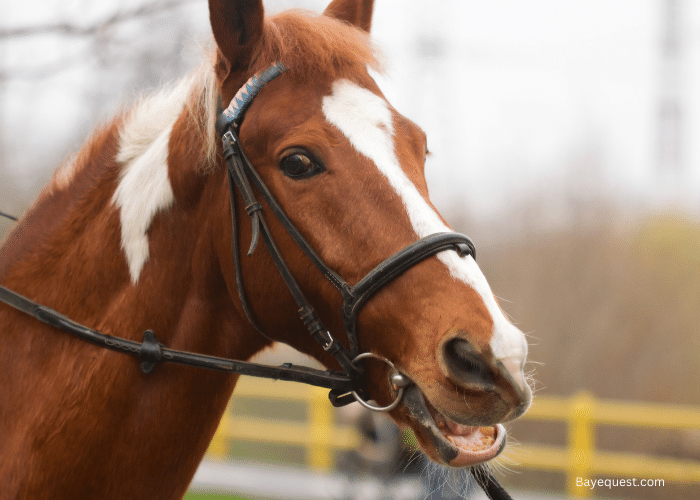Have you ever wondered what a Cob horse is? These sturdy, charming creatures are a favorite among beginner and seasoned riders.
Known for their calm demeanor and impressive strength, Cob horses excel in various settings. They’re not just versatile and reliable; they also carry a rich heritage that enhances their appeal.
Whether you’re considering one as a companion or simply curious about their qualities, Cob horses offer a fascinating world to explore.
Let’s dive deeper and uncover the unique traits that make Cob horses special.
What is a Cob Horse?
A Cob horse is a sturdy, well-built horse known for its calm temperament and strength. These horses are not particularly tall but very robust, making them excellent for riding, driving, and farm work.
Both beginners and experienced riders favor cobs because of their dependable nature and versatile abilities. A Cob can be a reliable partner on a quiet trail or in a busy arena.
Their thick manes and feathered hooves make them functional and have a distinctive, charming appearance.
Is Cob Horse a Breed or a Type?
Cob horses are actually considered a type rather than a specific breed. This means they’re defined by their build and temperament rather than their bloodline.
Cobs are sturdy, compact, and generally calm. They come in various sizes and can include different breeds that fit this description.
So, when you hear someone talk about a Cob, they’re referring to the horse’s characteristics and suitability for certain tasks, not its pedigree.
History of the Cob Horse
The history of the Cob horse is as interesting as it is varied. Cob horses originated in the British Isles, where their sturdy build and steady temperament made them invaluable.
Historically, Cobs were used for various tasks, from pulling carts and carriages to working the land. Their versatility comes from their strength and endurance.
Cobs were often the horse of choice for many farmers and tradespeople because they could handle heavy loads and cope well with difficult terrain.
They were also popular for riding, especially for those needing a reliable and comfortable mount.
As the industrial age progressed, the role of the Cob in agriculture and transport diminished, but their popularity did not wane. Instead, they found new roles in leisure and competitive activities.
Today, Cobs are celebrated in show rings across the world for their ability to participate in driving, dressage, and jumping. They are particularly well-known for their success in driving competitions.
The Cob horse’s enduring appeal lies in its robustness, reliability, and gentle nature, making it a cherished companion.
Characteristics of Cob Horses
Cob horses are beloved for their distinctive characteristics. Here’s a closer look at their key traits:
Conformation
Cobs have a strong, compact build. They have a short, sturdy body, broad chest, and muscular neck.
Their legs are powerful with good bone structure and often have feathers around their fetlocks. This robust conformation gives them strength and endurance.
Color
Cob horses come in a variety of colors. The most common colors include black, bay, grey, and chestnut, but they can be found in almost any solid color.
Their coats are often thick and may become particularly plush in the winter.
Temperament
One of the most cherished traits of the Cob horse is its temperament. Cobs are generally calm, friendly, and easygoing.
They are also reliable and level-headed, which makes them excellent choices for beginner riders or families. Their good nature also makes them suitable for therapeutic riding programs.
Discipline
Cobs are versatile when it comes to disciplines. They excel in many areas, such as:
- Driving. Cobs are perhaps most famous for their capabilities in carriage driving due to their strength and steady demeanor.
- Dressage. They can perform well in dressage, offering smooth and steady movements.
- Jumping. Their power and agility make them quite effective in show jumping and cross-country events.
- Pleasure riding. Cobs are also popular for leisure riding, providing a comfortable and secure ride.
Size
Cobs are generally not very tall. Their heights vary between 13 and 15.2 hands (52 to 62 inches at the shoulder).
Their size, combined with their stocky build, makes them substantial enough to carry adults comfortably.
Mane and tail
Cobs often feature luxurious manes and tails, which can be thick and flowing. This characteristic adds to their striking appearance.
Their manes and tails are beautifully groomed and accentuated in shows and parades.
Hooves
Their hooves are generally strong and hardy, which is beneficial for a working horse. This characteristic helps them manage well on different terrain, reducing the likelihood of hoof problems.
Intelligence and trainability
Cobs are intelligent and willing to learn, which makes them easy to train. They respond well to consistent and respectful handling, making them suitable for various equestrian activities.
Endurance and hardiness
Cobs are remarkably tough and have great stamina. They can work for long periods without showing signs of fatigue.
Their hardiness also makes them less prone to certain health issues compared to more refined breeds.
Types of Cob Horses
Welsh cob
The Welsh Cob comes from Wales and is celebrated for strength and agility. Known for their great temperament, they excel in riding and driving competitions.
Welsh Cobs are often used in sports because they are fast and have good endurance. They stand out with their high-stepping trot and the ability to comfortably carry children and adults.
Irish cob
Also known as the Gypsy Vanner in the U.S., the Irish cob is robust and exceptionally gentle. Bred originally to pull carts, these horses have heavy feathering on the legs and often come in piebald or skewbald patterns.
They are particularly popular for leisure riding thanks to their calm nature.
Gypsy cob
The Romani people bred Gypsy Cobs to pull their vardos across the British Isles. They are very similar to Irish Cobs, known for their docile temperament and striking appearance.
Gypsy Cobs are durable and are cherished family horses, suitable for riders of all levels.
Colored cob
The Colored Cob refers to any horse with a distinctive pinto coat pattern, such as piebald or skewbald. This isn’t a separate breed but a description of their coat.
Colored Cobs are often seen in shows due to their eye-catching appearance and are admired for their beauty and versatility.
Norman cob
Originating from Normandy, France, Norman Cobs are known for their work ethic. They were historically used for farm work and pulling carriages.
Today, they are also popular for leisure riding and competitive driving. These Cobs are strong and can adapt to various equestrian activities, making them well-suited for many roles.
Vanner cob
Often synonymous with the Gypsy Cob in America, the Vanner Cob is sturdy and suitable for pulling duties. They share many characteristics with the Irish Cob, including their calm demeanor and striking looks.
Vanner Cobs are reliable, easy to train, and make great family horses, especially for carriage driving.
Can Cobs Jump?
Yes, Cobs can jump. Despite their sturdy build and compact size, Cobs are quite capable jumpers.
Their strength and agility allow them to clear obstacles with ease. While they might not compete at the highest levels like some of the best jumping horse breeds, they are good for amateur and lower-level competitions.
They are also appreciated for their steady nature and reliability on courses. Cobs like the Welsh Cob are particularly noted for their versatility in this area.
Can Cobs do Dressage?
Yes, Cobs can do dressage. Their calm temperament and willingness to learn make them well-suited for dressage.
While Cobs may not be the traditional choice for high-level dressage competitions, they can perform well at lower levels and in amateur dressage events.
Their steady movements and good nature make them ideal for riders learning the intricacies of dressage. Welsh Cobs, in particular, are known for their ability in this arena.
They have a good natural rhythm and balance, essential dressage qualities. This makes them a favorite among riders who appreciate a dependable and manageable horse in the dressage ring.
Who Should Own a Cob?
Who should own a Cob? Really, anyone looking for a versatile, gentle, and sturdy horse would find a great companion in a Cob.
They are particularly well-suited for beginners because of their calm and forgiving nature. Families also love Cobs for their reliability and the safety they offer to younger riders.
Riders who enjoy a variety of equestrian activities will appreciate Cob’s adaptability. Their easy-going temperament and robust build also make them excellent choices for therapeutic riding programs.
In short, if you’re seeking a dependable, all-around horse, a Cob could be the perfect match.
Health Overview of Cob Horses
Cob horses are generally very healthy. They are known for their hardiness and long life. Still, like all horses, they have some health issues to watch for.
Common concerns include obesity because they gain weight easily. Good diet management is crucial.
They also have heavy feathering on their legs, which can hide skin problems and diseases. They need regular grooming to prevent issues like mud fever.
Lastly, due to their robust build, they can be prone to laminitis. Careful feeding and regular exercise help keep this risk low.
Overall, with proper care, Cobs tend to be resilient and low-maintenance horses.
Care and Management of a Cob Horse
Caring for a Cob horse involves several important steps to keep them healthy and happy. Here are some of the steps:
Veterinary exam. Regular check-ups are a must. Have a vet examine your Cob at least once a year. They’ll check for any health issues and make sure your horse is fit.
Vaccination. Keep up with vaccinations. They protect your Cob from serious diseases. Your vet can recommend the right vaccines for your horses.
Deworming. Deworm regularly. This keeps internal parasites under control. Your vet can suggest a deworming schedule based on your Cob’s needs.
Dental care. Look after their teeth. Horses need dental check-ups too. This prevents eating problems and discomfort. A vet or equine dentist should check their teeth at least once a year.
Farrier services. Don’t forget the hooves. Cobs need regular hoof care. A farrier should trim their hooves every six to eight weeks to prevent foot problems.
Diet and exercise. Monitor their diet closely. Cobs can easily become overweight. Provide a balanced diet and regular exercise to keep them in good shape.
Grooming. Groom your Cob often. Pay special attention to their legs. This helps spot any skin issues hidden by their feathering.
Cob Horse Nutrition Program
A good nutrition program is crucial for keeping a Cob horse healthy and happy. Here’s a straightforward guide on how to feed a Cob:
Assess the need. First, consider your Cob’s activity level, age, and health. Cobs are prone to gaining weight, so their calorie intake should be carefully managed.
Forage. Make forage the basis of their diet. Hay or grass should make up the majority of their intake. This helps keep their digestive system healthy and prevents overeating.
Concentrates. Use concentrates sparingly. If your Cob is active or needs extra nutrition, you can add a small amount of grain or commercial feed. But be careful, as too much can lead to weight gain and other health issues.
Balancers. Consider a vitamin and mineral balancer. This ensures they get all the necessary nutrients without too many calories. It’s especially useful for Cobs on a forage-only diet.
Monitor body condition. Keep a close eye on their body condition. Adjust their diet based on their weight and work level. A body condition score system can help you determine the right amount of food.
Regular feeding times. Stick to a regular feeding schedule. This helps maintain their metabolism and prevents digestive problems.
Access to water. Always provide plenty of fresh, clean water. This is vital for their overall health. (Now, find out how long a horse can go without water.)
Avoid sugars and fats. Limit sugary treats and fatty foods. Cobs are at risk for conditions like laminitis, and a high-sugar diet can increase this risk.
How Much Do Cobs Cost?
The cost of a Cob horse can vary depending on several factors, including the horse’s age, training, pedigree, and overall health. Here are some general guidelines:
Basic riding cobs. These are typically non-competitive, pleasure-riding horses. Prices can range from around $1,000 to $5,000.
Show quality cobs. These Cobs are suited for competitions, including dressage, jumping, or driving. They might be priced higher due to their training and potential, often ranging from $5,000 to $10,000 or more.
Young and untrained cobs. Foals or young Cobs with minimal training might be available for less, possibly under $1,000. This is especially if they are being sold directly from a farm without professional training.
Rare or high pedigree cobs. Cobs with a proven lineage or those bred from award-winning parents can command higher prices, sometimes exceeding $10,000.
The prices also depend on the local market and the specific type of Cob. You must also consider additional costs such as veterinary checks, transportation, and ongoing care and maintenance.
Where to Buy a Cob Horse
If you’re looking to buy a Cob horse, here’s where you can start:
Local farms. Check out farms in your area that specialize in Cobs. Visiting in person gives you a chance to see the horses and choose one that suits you.
Horse dealers. Contact reputable horse dealers. They often have a variety of Cobs available and can help match you with the right horse.
Online listings. Look at online horse sales platforms. Websites like EquineNow and HorseClicks list Cobs for sale. Always research the seller before making a purchase.
Horse shows. Attend local horse shows. They often feature Cobs and give you a chance to meet owners and breeders.
Breed associations. Connect with Cob breed associations. They can provide referrals to trusted breeders.
Social media groups. Join horse-related social media groups. People often post horses for sale or can offer advice on where to find Cobs.
Remember to take your time to find the right horse. Ask questions, check references, and consider getting a pre-purchase veterinary exam. This helps ensure you find a healthy, well-suited Cob for your needs.
Are Cob Horses Warmblooded or Coldblooded?
Cob horses are coldblooded. In the world of horses, “coldblooded” doesn’t refer to their body temperature but to their temperament and build.
Coldblooded horses like Cobs are known for their calm, steady, and gentle nature. They are also strong and sturdy, which makes them great for work and leisure activities.
This contrasts with warmblooded horses, often more spirited and used for competitive sports. Coldblooded horses are excellent choices for those who need a reliable and easygoing partner.
FAQs
How long do cobs live?
Cobs enjoy a long lifespan, often living between 25 and 30 years. Their longevity is influenced by various factors, such as genetics, quality of care, and living conditions. Proper veterinary care, good nutrition, and regular exercise also contribute to a cob’s health and lifespan.
How fast are cobs?
Cobs are not known for their speed but rather for their strength and stamina. They can maintain a steady trot and are capable of a brisk canter. While they won’t match the speed of racehorses, their endurance makes them excellent for trail riding and driving.
Can cobs live out all year round?
Yes, Cobs can live outdoors throughout the year due to their robust and hardy nature. They have a thick coat that provides natural insulation against cold weather. However, you need to provide them with adequate shelter from the elements, such as a dry, draft-free stable or a sheltered pasture area.
Conclusion
As we wrap up our exploration of Cob horses, it’s clear why these sturdy, gentle giants capture the hearts of so many. Whether you’re a seasoned equestrian or a first-time horse owner, a Cob offers not just a pet, but a partner.
With their versatile nature and amiable disposition, Cobs are perfect for various riding styles and activities. They bring not only joy and reliability to their tasks but also a rich history and character to every stable.
If you’re looking for a horse that embodies strength, loyalty, and calmness, the Cob might just be your perfect match.



